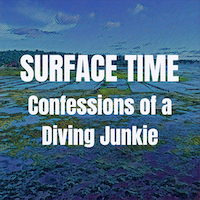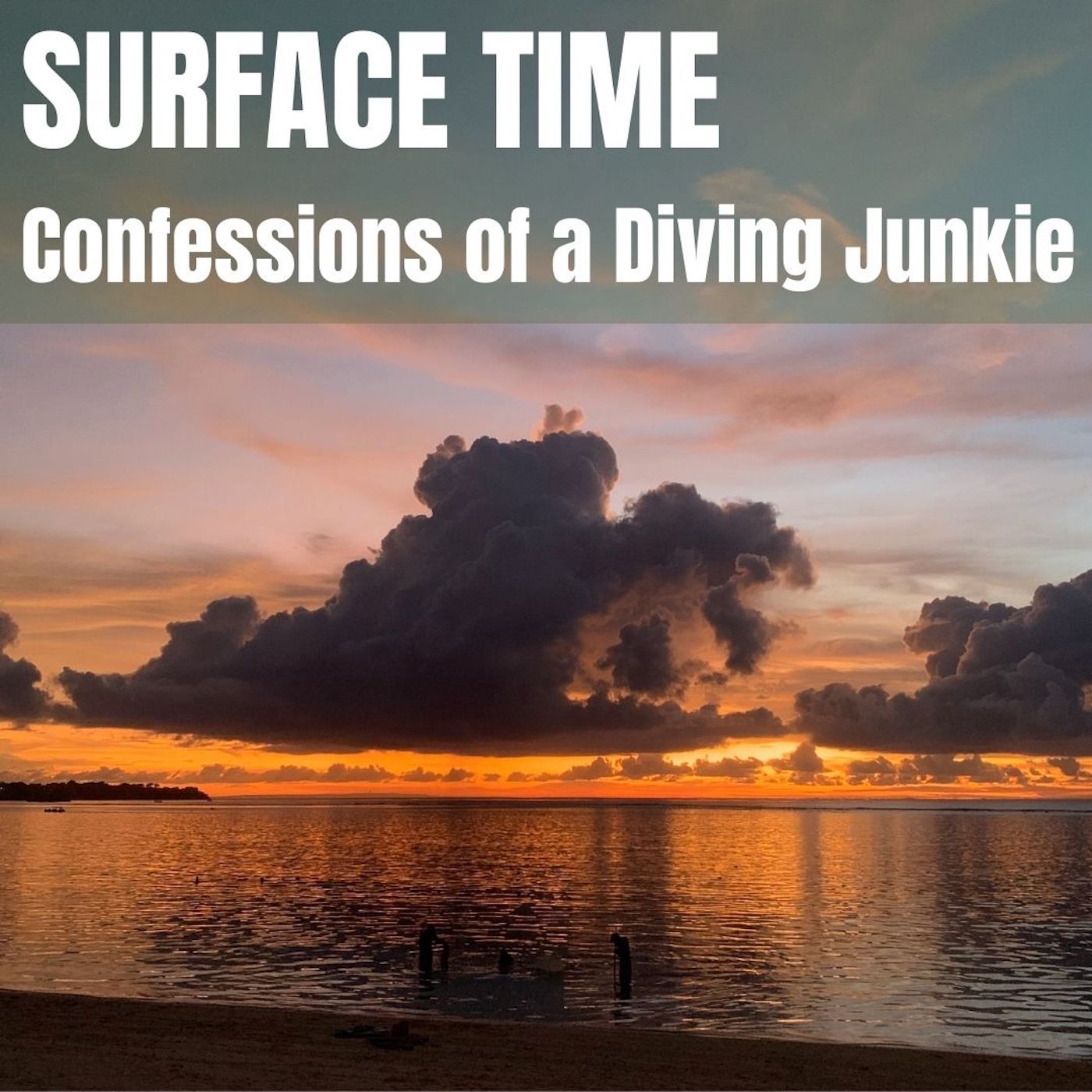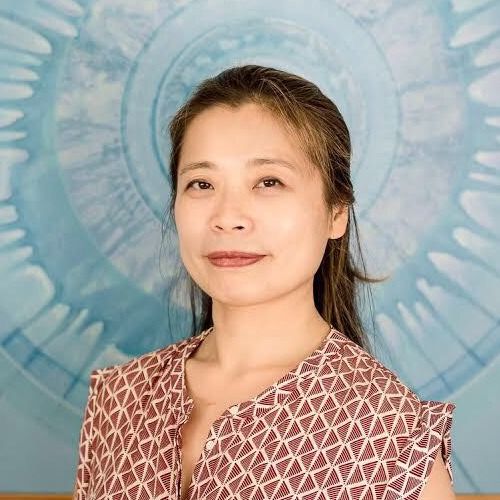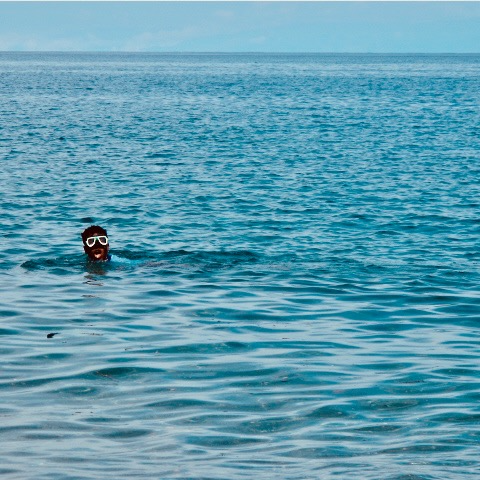Episode 3
S1 Ep2: Nico de Rouge on Thinks Less about Convention
Nico de Rouge, a French photographer and PADI Instructor living in Shanghai, had recently published his work on major publications like The Economist. He first caught the travel bug at the impressionable age of 19 and has since lived and travelled across North and South America, Africa and South East Asia. When we spoke, he was caught in the middle of the lockdown in Shanghai. Somehow he has managed to walk around the streets of Shanghai and documented the events happening during the lockdown in April 2022. His curiosity and willingness to take risks have taken him places for new experiences.
Connect with Nico
W: https://nicoderouge.com/
IG: https://www.instagram.com/nicoderouge.photo/
Connect with us:
W: https://www.surfacetimechats.com/
FB: https://www.facebook.com/surfacetimechats
IG: @surfacetimechats or https://www.instagram.com/surfacetimechats/
TG: https://t.me/surfacetimechats
TW: @surfacetimechat (no “s”)
Transcript
During the surface time today, I chatted with Nico de Rouge, a French photographer and PADI instructor living in Shanghai. He first caught the travel bug at the impressionable age of 19, and has since lived and travelled across America, Africa, and Southeast Asia. When we spoke, he was caught in the middle of the lockdown in Shanghai. Somehow he has managed to walk around the streets of Shanghai and documented the events happening during the lockdown in April 2022.
Hi, Nico!
[:Hey,
I'm
[:[00:01:04] Nico de Rouge : Still look down,
[:[00:01:27] Nico de Rouge : It's been a little bit frustrating to say the least because we don't know. Until when we're locked down. So it was supposed to be four days, but we're entering the fifth week now. So it's a very long four days. But I think the experience has been very different between different people.
And as per my personal experience, I can't really complain too much. My fridge is just full of foods. My neighbors are rather nice and open-minded, and I haven't tested positive yet. So I was able to stay at home and not be sent to isolation camp. It's just a bit boring and frustrating cause we don't know when we're out, but I have a ton of things I can do or read at home. So it's all right.
[:Actually I want to ask where was your last memorable dive?
[:And so I started learning to dive with a dry suit, which I had never done before in a lake called thousand islands lake in China in very cold, very murky waters. So that was one day of diving in the whole year of last year. And it was memorable because I couldn't even see my fins and I couldn't feel my toes.
[:[00:03:50] Nico de Rouge : Yeah. It's an insulated suit. Basically you have like joints at the wrists, at the ankles and at the neck. And so your feet, hands and head are exposed to the water, but apart from that, you're actually completely dry. So you're supposed to wear like winter clothes under your dry suit, because it doesn't bring you as much heat as a wet suit would.
You're actually wearing thick sweater and overalls under your dry suit and that way you've managed to retain heat, but the challenge with the dry suit and the reason why you have to learn to use it is that it is one more item that you carry with you that adds buoyancy. So you have to deal with adding air inside of your suits and taking air out of your suits. So that's the whole new, let's say dimension to diving compared to wet suit that we're used to in Southeast Asia.
[:[00:05:09] Nico de Rouge : You would carry a bit more weight with the dry suit. The main challenge is that now your buoyancy control is not only the BCD because you also need to control your buoyancy with the suit. You don't want to have too little air inside or you'll get compressed and your skin will actually get bruised and hurts and if you go too deep . You're going to be just like these vacuum bags that you can pack your suitcase with when there is no more air inside, completely stiff. But also you don't want to have too much air in your suit because you go on your way back up, then you're gonna inflate and shoot up.
In the diving, the setup is not that difficult at all. But the diving, basically you have two BCDs.
[:[00:06:05] Nico de Rouge : Yeah.
[:[00:06:12] Nico de Rouge : It puts you off balance so much in the beginning. I'm a PADI instructor. When I started diving with this dry suit, I felt like I was open water diver again. My buoyancy was just all over. Compared to a wing, now the air can be everywhere around your body. And so one of the problems was actually, when you're going that the air would actually go up to my feet. And so my feet would pop up because all the air in the dry suit would go to my feet.
So the buoyancy in the beginning felt like it was completely different. I was super off balanced. I remember the two or three first dives in the pool. It was just couldn't get the hang of it. And then a little by little.
[:You're in Shanghai now and it's a port city, but not really a diving destination. Other than diving, what else is it keeping you occupied and busy in Shanghai?
[:Shanghai is a very exciting city. It's a huge city, but it's a lot of concrete. It's a lot of business. Miss the sand. I miss the fish and the salted water.
[:[00:08:11] Nico de Rouge : In general, starting your own photography business abroad is a very interesting challenge on its own, but about particular shoots, that came through some Chinese diving students I met in the Philippines, who actually have a production agency in Shanghai. It's a funny story.
And so a couple of months after meeting in the Philippines, we were both in Shanghai and they hired me to shoot some behind the scenes photos on a big TV commercial video shooting set. And so I thought, I'd just come by and shoot a few photos during the day with my camera and nothing big and then deliver.
But it turned out that between every videotape of the TV commercial, they actually wanted me to take like proper advertising photos of the models there on the set. Which I was not prepared for. And we didn't have lights you need for photo.
And they had a green screen, full of stains full of wrinkles, just like you would have for a amateur photographer in your garage, and this was a shoot for one of Chinese biggest automobile brand GAC. I had to make do with super low lighting and models who couldn't speak English and I was struggling a bit with Mandarin. And I spent two weeks editing and retouching after the shoot. Two weeks of my summer holidays, back home in France with my family and they were not too happy about it.
[:I was browsing at your website. You've got a few photos of the airport hanger that I recognize one of the aircraft I think is the Bombardier global model. What was the shoot about? I'm curious? I assumed that was a commercial, because since you to be able to go inside that parts of the airport. It must be quite an interesting event.
[:It was for a company here in Shanghai, who's taking care of maintenance, storage and airport services for private jets. So when you want to take off you actually check in and board in their private hanger and same thing when you land.
That was a really interesting shoot because I hadn't ever been in a private jet before that day. That was just one day when I thought, yeah this job is interesting. It's taking me places.
I remember that day very clearly because I was amused to be shooting something as luxurious as private jets, especially the day before I was shooting until 1:00 AM for a private champagne event for Dom Perignon, and so these two days I felt like I had made it. Hopefully one day I'm sipping champagne inside a private jet without my camera.
[:[00:11:28] Nico de Rouge : Exactly.
Hopefully in the air.
[:[00:11:51] Nico de Rouge : It's actually quite funny because now when I go now I don't travel much in the last few months, but whenever I go to Hong Shao airport in Shanghai the bus that takes me from terminal to my flights actually goes in front of that private hanger. So every time I see there and I always shoot a text to my client to wave them by the window of the bus.
[:[00:12:48] Nico de Rouge : We're at two now
[:[00:13:20] Nico de Rouge : Sure. On the commercial side, I would say with clients it depends on the kind of shoot. Let's say when it's an event or when it's a documentary, there isn't so much preparation apart from maybe a couple of days before you get brief, the location what's going to happen. Then on the day you do a walkthrough in the morning and just go with a rundown of the event
On the more commercial advertising stuff, I really want to make sure I understand exactly what the client wants and if it aligns with what I'm thinking visually, cause that's often something that creates disparity in my experience with clients is when you hear words about what the client wants, but then the image you have in your mind can be quite different.
So I like to communicate visually a lot. I usually plan the day with my assistant book people, props venues, equipment, studio and then once I propose some, example images, then we know what to build on during the shoot and having all that structure defined and sanctioned by the client before the shoot allows us to be free on the shooting day.
If there is something that happens on the shooting day or a new direction that we find that we really like, then we're able to go off script with the agreements of the clients, of course. And if not, we just follow the script that we have and it usually works quite well that way.
For personal projects. In:One with was very geometrical almost abstract architecture photography which is what I actually started my photography journey with. And then at the end of the year was a more portrait series about identity and how we identify or how we feel.
[:[00:15:33] Nico de Rouge : First, it was nice to breath some fresh air to be out of my apartment.
But also, yeah, took it as an opportunity to try and shoot some photos of something that hopefully is unique or doesn't happen again anytime soon. I didn't stay outside for too long because we were advised, we were allowed to go out, but strongly advised not for too long. In order not to bring COVID back to our compound and force everyone to be locked back in for an additional two weeks.
So I went on a couple of short walks just to document a little bit what's happening outside, because I'm guessing that more than at least 90% of people here are still locked in.
So they can see from their window, but it's different than being really in the street and seeing what's happening on the street level. It was mainly people in hazmat suits all around the streets, like makeshift COVID test centers, or doing what volunteers are supposed to do.
And then also people putting up fences around the apartment, building entrances, putting locks on shops. So I tried to shoot all of these. Along with like overloaded delivery guys, trying to get food to the few people who were able to order food. I shot a lot of these streets scenes that aren't their usual.
And then I tried to reach out to a bunch of media and newspapers websites to try and publish them to show what's really happening here. I was quite happy because it ended up being published in quite a few media. And so the lockdown wasn't a total waste of time for my photography.
[:So are you going to do something more with those photos because I'm sure that you've taken tons of photos.
[:Luckily I was able to shoot for AP, the Associated Press and through them get published in the Guardian and Telegraph and Independent and other media. And was able to shoot different series for like Bloomberg and the Economist.
I'm working at the moment with an illustrator to make it a little series from some photos that I took. This series has a little bit of a different objective than strictly showing the situation as a photojournalistic project. It's a bit of a cuter approach.
Like the illustrations that he'd done are a bit more cartoonish based on my photos. And this little project will come out as animation. Short little videos. It's more to show the behind the scene work of the volunteers. A lot of the volunteers just decided to help out and should be thanked for their effort. And at least in my personal interactions with all the volunteers. I've never had any problem. People have always been really helpful and nice given the circumstances. So this project will be a little more to let's say "Thanks" to the people who didn't have to help, but who decided to put their hazmat suits on and give a hand.
[:[00:19:26] Nico de Rouge : We're working on a series of between 10 and 15 final animations. Actually I'm really excited because it's joint project three artists working together. This guy his English name is Happy, which coincidentally is my Chinese name, Keh Ler, which means happy, and also means Coca Cola. So it's me taking the photos, him doing the illustration. And Jamie, my assistant, she's doing the animation.
Also I tried to give a little colorful tone to the photos, even though the situation is pretty grim. I wanted to give it a bit of colored pop feel, so it's not as sad as the situation reflects. And it matches quite well with the cartoonish illustration style that Happy uses.
[:I love the fact that you managed to find something colorful to enlighten a situation which may have otherwise been perceived as grim and depressing. instead, You're really pointing out where the silver lining is.
[:[00:21:13] Stephanie: When the series are already where can people see it?
[:[00:21:38] Stephanie: That sounds really exciting. Good luck.
You mentioned about the exhibition of geometrical like photographs. One thing I've picked up when I was browsing through your photos. To me, each photographer has something like a signature in your work. And that signature is not like physical autograph type of signature is the signature of like something about you. I like looking at your photo, it's very clean, very logical, very orderly. And although they're clean, they have a lot of information, details lots of details and the way you present it. So for some photographer there could be just minimalization and very abstract and that's their signature. In your case, you managed to pack information in an orderly, logical manner and yet it's beautiful to look at. It's a nice balance. So my question to you is what did you do before you became a photographer and a diving instructor?
[:I'd like to shoot in a more minimalistic way. But I think if you want to show a lot of details, or if you want to show a lot of elements, then you need to organize them. Cause if there is too many things to look at on the photograph the impact is lost. So I like to show a lot of things, but then I have to be really conscious and meticulous.
[:It doesn't look disorganised, it doesn't look chaotic. It is to really nice and orderly. As we speak, it's also reminds me of a book that was given by a friend so long time ago. I think it's called Phantoms of Shanghai. There was a collection of photos that must have been taken at least 15 years ago.
So when Shanghai was still going through the phase of being redeveloped and there's lots of dirt. There's a whole collection of images where you can see poverty and everything is just very chaotic . My friend obviously thought that was a great gift to me, considering that I love photography. I was very happy reading through it then. I was eating something, as I was browsing through the book, halfway through the book, I just wanted to throw up,
I think that's the power of the photo. This is where I say the signature of the photographer is really embedded in the work . I'm not a critic, so don't take me too seriously. I just like to study the psyche of the artist behind the work.
[:[00:25:13] Stephanie: It's the opposite to that. Trust me, there hasn't been any other work that gave me that kind of physical reaction.
So you travel, explore and experience different things. What is it about you that makes you want to do things and live your life this way, because obviously you have a choice to live a very safe, secure life that you could get a nice job somewhere in a big city. Instead of opting to that kind of lifestyle, you've opted to traveling, exploring the world and experiencing many things in life. What motivates you to do that?
[:That kind of started me on the traveling bug. I love to be somewhere where you are an alien, like you're not in your environment. I loved to adapt to new environment. It's super rewarding. And I think that's how I grow the most, by learning to adapt to new environments, new people, new cultures, new language et cetera, and then after a little while feeling like you're almost like a fish in water and you can adapt and thrive in this foreign environment is incredibly rewarding and it gives you the confidence to go onto the next one.
So to try in a new environment and try and another one and find another one. And I feel like by challenging myself, every time to move to a different country start something new, maybe change a job, maybe change two jobs. I managed to not let the years fly by, but actually it allows me to feel like each year is packed with new experiences and new things and interesting events and new learnings.
And that's how I want to keep on going. Like now I've been in China for about seven, eight years. It's time to go. I need to find something new and a new struggle in a good way to learn more. I like the struggle. And I don't say it in a bad way. When every day you have things that are unexpected and that you don't necessarily know how to react to it.
It's amazing. It's exciting every day, which is pretty rare. I think for most people who maybe stay in their home country or stay in the same job for a long time I don't mind being a bit unstable. I need the excitement.
[:[00:28:13] Nico de Rouge : I don't know about high risk because I think we overestimate risk a lot. Maybe it's also the type of education that I had or the social and economic environment in which I grew up. But I don't feel like I'm taking higher risks by moving to a different place, trying to change careers.
For me, I've been very lucky, but I don't think it's that hard to take these risks. Even if you fail or if you don't succeed as, as much as you would have liked, I've never really had a regret or something like a real setback. So I don't know how to go into high risks, but what I know is I'm really happy about the risks I took and unhappy about the risks I didn't take.
[:[00:29:28] Nico de Rouge : Make your bed.
Actually yeah. Make your bed, but that wouldn't be the first thing.
I think actually the main thing I would tell myself is what I just told you about risks is even though I feel like for the last few years I've taken risks. I'm still not really happy about a lot of the risks that I didn't take.
I would tell myself, don't think there is only like five career choices in front of you. Don't think there are only five life options in front of you. Because this is very much what I was feeling like when I was 18. I thought, all right, now you go to study at university. Either you become an engineer.
Either you become a marketer, either you become a lawyer. Very common tracks. I would have liked to know that it's all completely flexible and if you're 18 and you want to move to Costa Rica and become a skydiver, you can. And it's not gonna look bad on your resume is not gonna have any kind of negative consequences.
The worst thing that can happen is you struggled to do this for a year. You don't succeed, and you'll probably have learned more about life and yourself in five years of university. So I would tell myself to be more open to everything around and think less in terms of conventions.
[:Surface Time executively produced by Blue Yonder Production and music by Dredstudio.
If you have enjoyed our Surface Time chat. Please show us some love and subscribe. And if you will like to share your stories on surface time, we will love to hear from you. Please email us to faith@surfacetimechats.com.





